Preparing for exams can be overwhelming, with so much to review and remember. To help you stay organized and focused, we’ve created a series of exam preparation checklists that cover every aspect of the process. Whether you need to review study materials, manage your time, or ensure your mental and physical well-being, these checklists will guide you through each step, ensuring nothing is overlooked. Download these templates in MS Word format to make your exam prep smooth, stress-free, and successful.
Using these checklists offers several key benefits that can greatly enhance your study process. These checklists are designed to help you stay organized, reduce stress, and ensure you cover all necessary topics before the big day.
By incorporating these checklists into your study routine, you can approach your exams with confidence, knowing that you’re thoroughly prepared and on track for success.
Below is a collection of exam preparation checklist templates available for free download in MS Word format. These templates are designed to help you stay organized, manage your study time effectively, and ensure that you cover all essential material before your exams. Click on the links below to download each template:
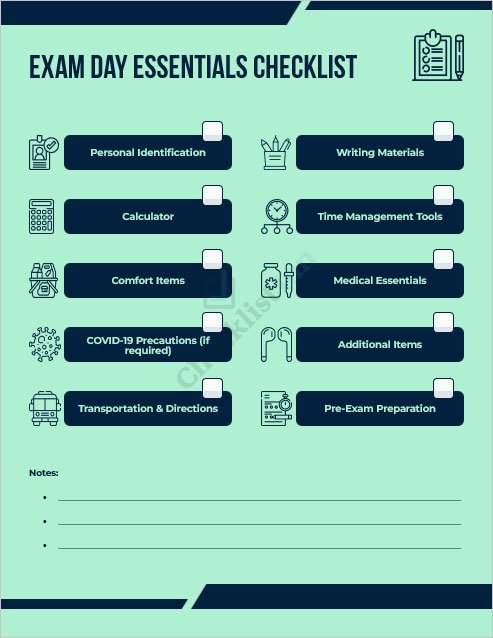
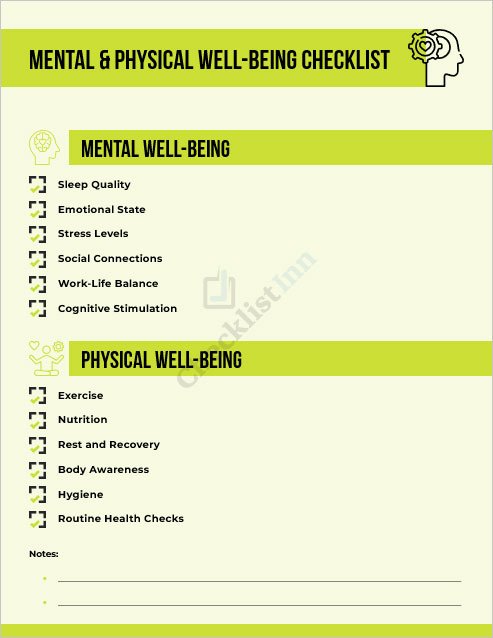
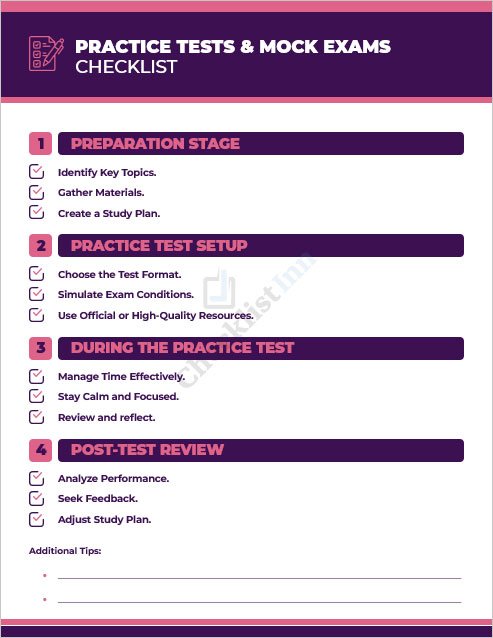
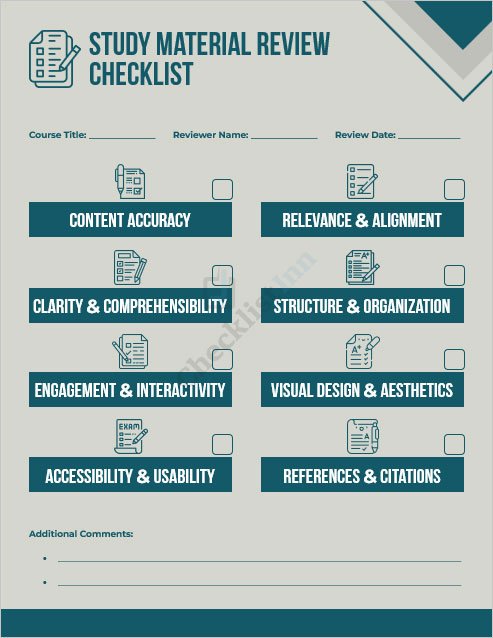
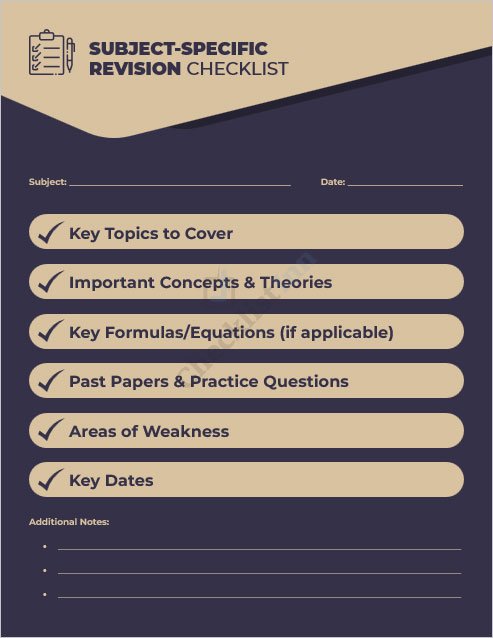
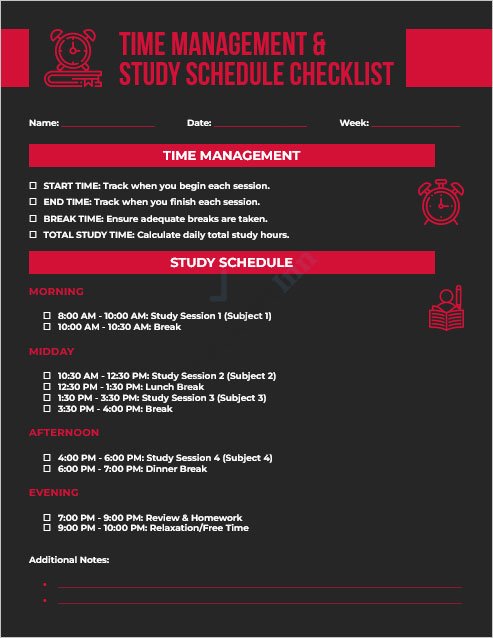
These templates are fully customizable, so you can adjust them to suit your individual study needs. Make the most of these tools to enhance your exam preparation and boost your confidence as you approach exam day.
A well-organized study plan is crucial for effective exam preparation. By following a structured approach, you can better manage your time, reduce stress, and enhance your understanding and retention of the material.
By adopting a structured study plan, you create a roadmap that guides your preparation, making it easier to stay on track, remain calm, and ultimately achieve better results.
This study plan is designed to help students effectively manage their time, reduce stress, and maximize retention of the material. While this plan provides a general structure, it’s important to customize it to fit your personal needs, study habits, and exam schedule.
| Week | Focus | Tasks |
|---|---|---|
| 1 | Overview & Organization | – Review syllabus and identify key topics. – Gather all study materials (notes, textbooks, previous exams). – Create a list of important dates (exams, project deadlines). |
| 2 – 4 | Topic-by-Topic Study | – Divide subjects into major topics. – Allocate specific topics to each week. – Start with the topics you find most difficult. – Use active learning techniques (e.g., summarizing, teaching the material to someone else). |
| 5 – 6 | Deep Dive & Practice | – Focus on problem areas or complex topics. – Begin taking practice tests or doing mock exams. – Review feedback from practice tests and adjust study plan accordingly. |
| 7 – 8 | Review & Reinforcement | – Review all topics with a focus on weaker areas. – Use flashcards, summary sheets, or mind maps. – Take timed practice exams to simulate test conditions. |
| 9 | Final Preparation & Relaxation | – Light review of key concepts. – Ensure all materials are organized for exam day. – Prioritize sleep, nutrition, and relaxation. |
| Exam Week | Exam Execution | – Review study notes the night before the exam. – Ensure adequate rest. – Eat a healthy meal before the exam. – Arrive early to the exam venue. |
| Time | Activity | Description |
|---|---|---|
| 6:00 AM | Wake Up & Morning Routine | – Start your day with a healthy breakfast. – Spend a few minutes planning your day. |
| 7:00 AM | First Study Session | – Focus on one subject or topic. – Use focused study techniques (e.g., Pomodoro method). |
| 9:00 AM | Break | – Take a 15-30 minute break. – Stretch, walk, or do something relaxing. |
| 9:30 AM | Second Study Session | – Continue with the next subject or topic. – Review notes, summarize, or practice problems. |
| 11:30 AM | Break | – Take another break. – Have a snack or do a quick workout. |
| 12:00 PM | Third Study Session | – Focus on a different subject or a particularly challenging topic. |
| 2:00 PM | Lunch Break | – Have a balanced meal. – Take a longer break to recharge. |
| 3:00 PM | Fourth Study Session | – Review or reinforce material from earlier sessions. – Engage in active recall or practice problems. |
| 5:00 PM | Break | – Take a break before the final study session. – Relax and recharge. |
| 6:00 PM | Fifth Study Session | – Light review or revision of the day’s work. – Prepare for the next day’s study sessions. |
| 7:30 PM | Dinner & Relaxation | – Have dinner and unwind. – Spend time with family or friends. |
| 9:00 PM | Evening Routine & Relaxation | – Light reading or review if needed. – Wind down with a relaxing activity. |
| 10:00 PM | Sleep | – Aim for 7-8 hours of sleep to ensure full rest and recovery. |
By following this general study plan and adapting it to your specific needs, you can approach your exam preparation with confidence, ensuring a comprehensive understanding of the material and reducing stress along the way.
Managing exam stress is crucial for performing your best on test day. Here are some effective strategies to help you stay calm and focused:
By incorporating these strategies into your exam preparation routine, you can manage stress more effectively and approach your exams with confidence.
4o mini